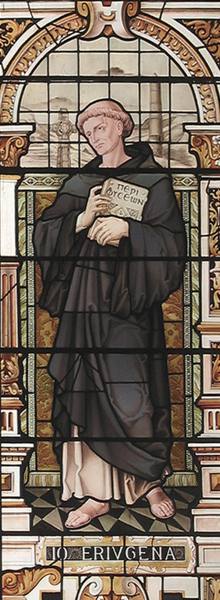
Back جون سكوتوس أريجينا Arabic دجون سكوتوس ARY جون سكوتس اريجيا ARZ Джон Скот Ериугена Bulgarian Ivan Skot Eriugena BS Joan Escot Eriúgena Catalan Jan Scotus Eriugena Czech Johannes Scotus Eriugena Danish Johannes Scottus Eriugena German Ιωάννης Σκώτος Εριγένης Greek
This article contains too many or overly lengthy quotations. (October 2023) |
John Scotus Eriugena | |
|---|---|
 Stained glass window in the chapel of Emmanuel College, Cambridge. Depicted as an early Benedictine monk, holding his book De Divisione Naturae. Behind him, seen against the night-sky, are an Irish Round Tower and a Celtic cross. (1884) | |
| Born | 5 November, c. 815[3] |
| Died | c. 877 (age c. 62) probably West Francia or Kingdom of Wessex |
| Other names | Johannes Scottus Eriugena, Johannes Scotus Erigena, Johannes Scottigena |
| Era | Medieval philosophy |
| Region | Western philosophy |
| School | Neoplatonism Augustinianism[1] |
Main interests | Free Will, Intersubjectivity, Logic, Metaphysics, |
Notable ideas | Four divisions of nature[2] |
| Part of a series on |
| Scholasticism |
|---|
 |
John Scotus Eriugena,[a] also known as Johannes Scotus Erigena,[b] John the Scot, or John the Irish-born[4] (c. 800 – c. 877)[5] was an Irish Neoplatonist philosopher, theologian and poet of the Early Middle Ages. Bertrand Russell dubbed him "the most astonishing person of the ninth century".[6] The Stanford Encyclopedia of Philosophy states that he "is the most significant Irish intellectual of the early monastic period. He is generally recognized to be both the outstanding philosopher (in terms of originality) of the Carolingian era and of the whole period of Latin philosophy stretching from Boethius to Anselm".[7]
He wrote a number of works, but is best known today for having written De Divisione Naturae ("The Division of Nature"), or Periphyseon, which has been called the "final achievement" of ancient philosophy, a work which "synthesizes the philosophical accomplishments of fifteen centuries".[8] The principal concern of De Divisione Naturae is to unfold from φύσις (physis), which John defines as "all things which are and which are not",[9] the entire integrated structure of reality. Eriugena achieves this through a dialectical method elaborated through exitus and reditus, that interweaves the structure of the human mind and reality as produced by the λόγος (logos) of God.[10]
Eriugena is generally classified as a Neoplatonist, though he was not influenced directly by such pagan philosophers as Plotinus or Iamblichus. Jean Trouillard stated that, although he was almost exclusively dependent on Christian theological texts and the Christian Canon, Eriugena "reinvented the greater part of the theses of Neoplatonism".[11]
He succeeded Alcuin of York (c. 735–804) as head of the Palace School at Aachen. He also translated and made commentaries upon the work of Pseudo Dionysius the Areopagite and was one of the few Western European philosophers of his day who knew Greek, having studied it in Ireland.[12][13] A later medieval tradition recounts that Eriugena was stabbed to death by his students at Malmesbury with their pens, although this may rather be allegorical.[14]
- ^ Predestination: Biblical and Theological Paths
- ^ Moran, Dermot. "John Scottus Eriugena". In Zalta, Edward N. (ed.). Stanford Encyclopedia of Philosophy.
- ^ Curtin, D. P. (17 March 2022). Testament of Some Former Things. Dalcassian Publishing Company. ISBN 9781960069702.
- ^ Wood, Michael (August 2022). "The voice of this funny polymath can still be heard 1,200 years later". BBC History Magazine.
- ^ Moran, Dermot (2019), "John Scottus Eriugena", The Stanford Encyclopedia of Philosophy
- ^ Russell, Bertrand. The History Of Western Philosophy
- ^ "John Scottus Eriugena". The Stanford Encyclopedia of Philosophy. Metaphysics Research Lab, Stanford University. 8 October 2023.
- ^ Cite error: The named reference
:7was invoked but never defined (see the help page). - ^ Erigenae, Johannis Scoti (1838). De divisione naturae: libri quinque. p. 1. ISBN 2-89007-634-2.
- ^ Carabine (2000). John Scottus Eriugena. Oxford: Oxford University Press. pp. 29–37.
- ^ Trouillard, Jean; Berland, Frédéric (2014). Jean Scot Érigène: études. Collection Hermann philosophie. Paris: Hermann. ISBN 978-2-7056-8827-1.
- ^ Cite error: The named reference
eriugenawas invoked but never defined (see the help page). - ^ See specifically Freemantle, Anne, p 78.
- ^ Henry Bett (1964). John Scottus Erigena. New York: A Study in Mediaeval Philosophy.
Cite error: There are <ref group=lower-alpha> tags or {{efn}} templates on this page, but the references will not show without a {{reflist|group=lower-alpha}} template or {{notelist}} template (see the help page).